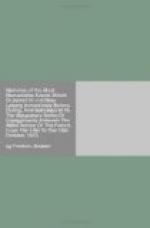sentiments less generous and humane than they did.
It behoved them to gain possession of Leipzig at any
rate; and this object they might have accomplished
in the shortest way, and with inconsiderable loss to
themselves, if they had bombarded it for one single
hour with shells, red-hot balls, and Congreve rockets,
with which an English battery that accompanied them
was provided. Their philanthropic spirits, on
the contrary, revolted at the idea of involving the
innocent population of a German city in the
fate of Moscow and Saragossa. They resolved to
storm the town, and to support the troops employed
in this duty with artillery no farther than was necessary
to silence the enemy, and to force their way through
the palisaded avenues and gates. Meanwhile the
discharges of artillery, quite close to us, were so
tremendous, that each seemed sufficient to annihilate
the city. The king of Saxony himself sent flags
of truce, entreating that it might be spared.
The allies replied that this should be done in as
far as the defence of the enemy might render it practicable:
they promised, moreover, security to persons and property
after the place should be taken, and to enforce as
rigid discipline as it was possible on such an occasion.
To these assurances they annexed the condition that
no French should be secreted in the city, declaring
that every house in which one or more of them should
be found would run the risk of being reduced to ashes.
The cannon, though only in a proportionably small
number from the north and east, immediately began
to play. They were partly directed against the
palisades at the gates, partly against the French artillery
which defended the avenues. For more than two
hours balls and shells from the east and north frequently
fell in the city itself, and in the suburbs.
Many a time I was filled with astonishment at the effects
of one single ball, which often penetrated through
two thick walls, and pursued its course still farther.
Though they seldom fell in the streets, it was impossible
to venture abroad without imminent hazard of life,
as these tremendous visitors beat down large fragments
of roofs, chimneys, and walls, which, tumbling with
a frightful crash, threatened to bury every passenger
beneath their ruins. Still greater havoc was made
by the shells, which, bursting as soon as they had
descended, immediately set their new habitations in
flames. Fortunately for us, but few of these
guests were sent into the city. The most that
fell came from the north, that is, in the direction
of Halle. Three times did fires break out in
the Bruehl, which, in a short consumed several back
buildings contiguous to the city wall, and nothing
but the instantaneous measures adopted for their extinction
prevented farther damage. The allies had no other
object, in dispatching these ministers of destruction,
than to shew the retreating enemy, who, in the general
confusion and bustle, could no longer move either
forward or backward, that, if they now forbore to
annihilate him, it was because the innocent citizens
might be involved in equal destruction with the fugitives.
Pfaffendorf, a farm-house near the north side of the
city, had previously been set on fire, when the Russian
jaegers had penetrated thither through the Rosenthal,
and was consumed to the very walls. As this place
had been converted into an hospital, many poor fellows
there fell a sacrifice to the flames.




